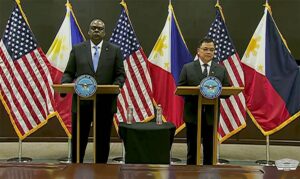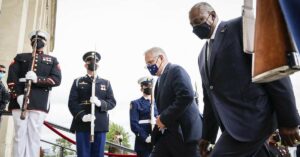The Enhanced Defense Cooperation Agreement (EDCA) between the Philippines and the United States, initially signed in 2014 and aimed at bolstering military cooperation by allowing the U.S. to rotate troops into the Philippines for extended stays and to preposition defense assets, has reached a critical juncture with the proposed installation of additional four EDCA sites (American bases) in the country. While proponents of the agreement argue it enhances the Philippines’ defensive capabilities and contributes to regional security, it is imperative to scrutinize the potential repercussions of expanding this military footprint. The expansion of EDCA bases raises significant questions about the implications for national sovereignty, the peace and security of the Asia Pacific, and the Association of Southeast Asian Nations (ASEAN) region, as well as the public sentiment on this issue.
Sovereignty Under Siege:
The fundamental issue of national sovereignty is at the heart of the debate surrounding EDCA. The presence of foreign military installations on Philippine soil is a contentious topic that harks back to the era of U.S. bases, which were expunged in the 1990s following a surge of nationalist sentiment. Adding four new EDCA bases could reverse these gains, suggesting a re-colonization of Philippine territory. Sovereignty is not merely territorial; it encompasses the capacity of the state to exercise unimpeded jurisdiction and control within its domain. The increased presence of U.S. military forces undermines this principle and risks placing the Philippines in a dependent position, potentially compromising its autonomy in foreign policy and national security matters.
Implications for Regional Security Dynamics:
Furthermore, the proposed expansion of EDCA bases cannot be viewed in isolation but rather must be considered within the context of the Asia-Pacific geopolitics. The Asia-Pacific region is a complex environment with evolving power dynamics and geopolitical tensions, notably the rise of China, the South China Sea dispute, and the volatile situation of the Taiwan Strait. The installation of an additional four U.S. bases in the Philippines is likely to exacerbate regional tensions, signaling an escalation of the U.S.-China rivalry and inviting reciprocal military posturing. For ASEAN, a bloc that prides itself on diplomacy, this could be detrimental to the regional equilibrium and the bloc’s centrality in managing regional security.
Impacts on Peace and Security:
Moreover, the shadow of increased military presence does not necessarily forecast a more secure future. Historically, militarization in proximity to disputed territories has often led to a security dilemma, where one state’s defensive enhancements are perceived as a threat by others, prompting a cycle of arms buildup. This dynamic could be catalyzed by the expansion of EDCA bases, potentially leading to an arms race that undermines peace and security in the region. Additionally, the overt presence of U.S. military might on Philippine soil could render the Philippines a strategic target in the event of escalated conflicts, thus jeopardizing rather than safeguarding national and regional security.
Public Sentiment and Historical Context:
Likewise, public sentiment cannot be disregarded when discussing agreements that have long-term national implications. The historical context of foreign military presence in the Philippines, notably during the American colonial period and the subsequent bases that remained until the early 1990s, still resonates with many Filipinos. There is a substantial segment of the population that remains wary of foreign military agreements, which they view as inconsistent with the spirit of independence and self-determination that has been a cornerstone of Filipino national identity.
Consider, for instance, the “Anti War, Anti-EDCA Movement for Peace” in Cagayan—a dedicated group of concerned citizens vehemently opposing EDCA and establishing new EDCA bases in their province and has been actively protesting against EDCA. They’ve organized a series of passionate prayer rallies and compelling demonstrations to amplify their dissent against EDCA. Engaging in peaceful protest, they recently convened at Rizal Park in Tuguegarao City on November 8, 2023, for a prayer rally. With urgency in their voices, they declared, “NO TO EDCA SITES, SUPPORT NATIONAL HERO GOVERNOR MAMBA, OPPOSE THE CONSTRUCTION OF US MILITARY BASES,” directing their plea to the leadership of President Ferdinand Marcos Jr. and the Philippine government, reflecting a deep-rooted stance against military escalation and a plea for prioritizing basic needs over ammunition, encapsulated in their rallying cry, “Bigas Hindi Bala (Rice Not Bullets).” Their fervent calls were encapsulated in a poignant Filipino press statement resonating with their unwavering commitment to peace.
PRESS STATEMENT
Ika-08 ng Nobyembre 2023
Mariing namin tinututulan ang pagpapatuloy ng EDCA dito sa aming bayan sa Cagayan at sa iba’t iba pang lugar sa Pilipinas dahil naniniwala kami, na mula ng andito ang EDCA ay mas lalung umiinit ang tensyon sa asya pasipiko at lubha ng naapektuhan ang kabuhayan ng mga mangingisda at negosyante, nababahala sa patuloy na nangyayari sa WEST PHILIPPINE SEA-AYUNGIN SHOAL.
Nababahala kami sa mga pahayag at binibitawang mga salita ng ating mga pinuno sa security sector sa iba’t ibang media, na imbes daananin sa pamamagitan ng masusing consultation at dailogue upang maresolba ang mga hindi pagkakaunawaan at magkaroon ng maayos ng panuntunan sa WPS na mapapakinabangan ng ating bansa.
Dahil dito, aming pinapahayag ang pagkakadismaya sa ating mga pinuno, na mas inuuna pa ang pakikipagbaliktaktakan kesa resolbahin sa maayos na pamamaraan at diplomasya. Isang malaki at maraming “Thumbs Down” ang nababagay sa ating mga pinuno sa panseguridad bilang pagpapakita natin , na hindi tayo natutuwa sa kanilang mga aksyon at pamamaraan sa pagresolba sa tensyon sa bansang tsina. Lubos din natin tinitutulan ang pananatili ng lahat ng EDCA sites, na sa tingin natin ang pangunahing dahilan sa nagpapainit ng tensyon sa WPS.
Tayo ay magkaisa para iparinig natin ang nagkakaisang tinig ng mga Cagayano at ng malawak na mamamayan. Tayo ay magmartsa kasama ng buong Cagayano para isulong ang kakayapaan na walang EDCA, at itaas bilang makabayan Pilipino si Gov Mamba dahil tangi siya lamang ang may lakas ng loob tutulan ang EDCA at naninidigan para sa mamamayan.
PEACE4DEVELOPMENT!
MABUHAY!
Conclusion
In retrospect, the expansion of EDCA bases within the Philippines is a matter of profound concern that calls into question the very essence of Philippine sovereignty and regional stability. It is a decision that should not be made lightly or in isolation from the broader regional context. The public sentiment opposing EDCA should not be underestimated or ignored.
Indeed, the implications of an EDCA expansion are far-reaching, with the potential to alter the security landscape of the Asia-Pacific in unpredictable and possibly irrevocable ways. The Philippines, alongside its ASEAN partners, must carefully weigh the promise of security assistance against the risks to sovereign integrity and peace. In doing so, fostering a discourse that transcends immediate strategic interests and considers the long-term vision of a stable, independent, and peaceful region is essential. Only through such a comprehensive and reflective approach can the true interests of the Philippines and its neighbors be secured.
Source: Asian Century Journal
https://asiancenturyph.com/2023/11/11/rethinking-edca-at-stake-is-ph-sovereignty-regional-stability-public-outcry-against-edca-expansion/



